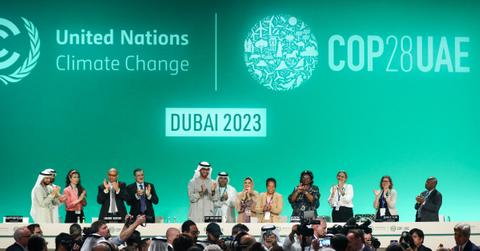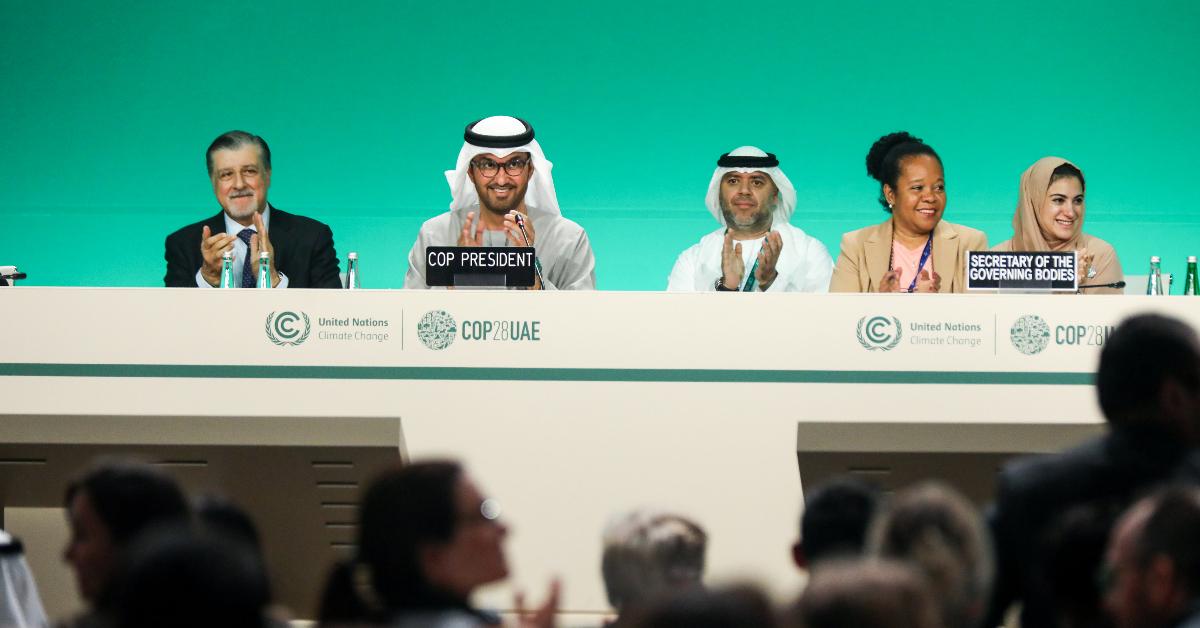At End of COP28, 170 Countries Sign Agreement to Transition Away From Fossil Fuels
Published Dec. 13 2023, 3:39 p.m. ET

The Gist:
- Though the "historic" COP28 climate deal calls for parties to "transition away" from fossil fuel usage, an official "phase-out" was axed.
- Many are skeptical of this thinned out deal, worried that a full phase-out of fossil fuels is the only way to majorly reduce carbon pollution.
- We're breaking down this deal, as well as sharing some of the other key takeaways from COP28.
The United Nations Climate Change Conference has been around since 1995, when the decision-making parties to the United Nations Framework Convention on Climate Change (UNFCCC) met for the first time — aka Conference of the Parties (COP).
The annual conference sees international bigwigs have a little get together "to measure progress and negotiate multilateral responses to climate change," as detailed by the UN. We imagine that coffee and little treats are also involved.
COP28 was held from Nov. 30 to Dec. 12, in Dubai, United Arab Emirates, and we're here to dissect the key takeaways. Let's talk everything from the major climate deal to the suspiciously worded fossil fuels agreement.

The key takeaway of COP28 is that not enough global action is being taken to fight climate change.
Considering how weak COP28's biggest deal was, who served as president for the event, and many other factors (more on all that below), it's clear that world leaders are not doing enough to truly fight climate change.
Here's a look at the biggest takeaways from COP28.
A "historic" global COP28 climate deal was signed, with aims to minimize fossil fuel usage.
After two weeks of conversations, late on Dec. 12, COP28 presented the world with an 11,000-word climate deal. The deal calls for the “transitioning away from fossil fuels in energy systems, in a just, orderly and equitable manner," as per The New York Times. Delegates from over 170 countries from around the globe signed the agreement, which does not yet have a name.
Some environmentalists applauded the document for actually addressing fossil fuels by name, since its predecessor, the Paris Agreement, infamously did not, as noted by The Washington Post.
However, the vagueness of the agreement has many climate activists skeptical, as room for improvement and blatant loopholes are present.
The agreement “calls on” nations to “contribute” carbon pollution reduction efforts, as per CNN. Of eight options listed, countries can opt to “[transition] away from fossil fuels in energy systems … accelerating action in this critical decade, so as to achieve net zero by 2050.”
Additionally, participating countries must have climate action plans in place by 2025, and renewable energy capacity is expected to be tripled and energy efficiency doubled by 2030.
Time will tell if this agreement actually makes a difference in fighting climate change — but unfortunately, we don't have much time. A lot more is going to be needed to truly prevent the climate crisis from getting worse.
Oil-producing nations opposed a complete "phase-out" of fossil fuels.
Asking countries to "transition" away from fossil fuels is a new concept, but CNN pointed out that the deal does not require a "phase-out" of fossil fuels. Those more concrete words were supported by over 100 countries, including the U.S. and the European Union, but rejected by oil-producing countries like Saudi Arabia.
This led to friction during the two-week COP28 period.
“There is a supermajority [of countries] that do want more ambition,” EU climate commissioner Wopke Hoekstra stated, according to Financial Times.
In the end, the deal will only go down in history as a grand success if countries involved swing big when it comes to minimizing fossil fuel usage. Unfortunately, there's not much time left for empty promises. According to a 2023 report from the UN Intergovernmental Panel on Climate Change, Earth will likely reach dangerous temperatures within the next 10 years, leading to "catastrophic warming," as expressed by The Washington Post.
Sultan Al Jaber made controversial remarks about "no science" linking fossil fuels to global warming.
The COP28 president, Sultan Al Jaber, made an alarming and untrue statement during COP28: "There is no science out there, or no scenario out there, that says that the phase out of fossil fuel is what’s going to achieve 1.5 [degrees Celsius].”
Did we mention he's also the CEO of oil company ADNOC?
The 2024 COP29 location will be another major oil-producing country.
Not only is Sultan Al Jaber directly linked to the fossil fuel industry, but the United Arab Emirates is an infamous oil giant, producing "an average of 3.2 million barrels of petroleum and liquids per day," as expressed by the International Trade Administration.
COP29 will be held at Azerbaijan, a country that saw oil, gas, and petroleum products included in a whopping 91 percent of its total 2022 exports. Naturally, this is worrying regarding the direction of COP29, but only time will tell.